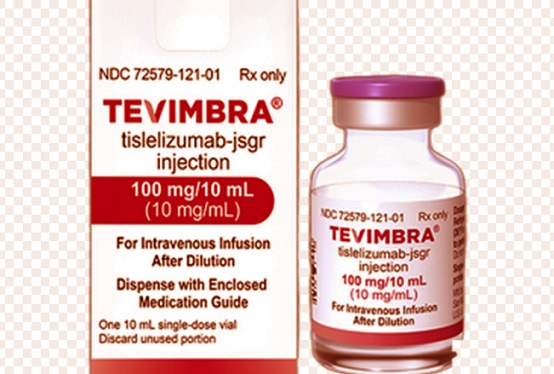U.S. FDA Approves Tislelizumab for Advanced Gastric Cancer Treatment in Combination with Chemotherapy
Nikhil Prasad Fact checked by:Thailand Medical News Team Jan 05, 2025 3 months, 1 week, 1 day, 6 hours, 44 minutes ago
Medical News: Advancing Cancer Treatment Tislelizumab Combines with Chemotherapy
The U.S. Food and Drug Administration (FDA) has approved tislelizumab (marketed as Tevimbra) in combination with chemotherapy as a first-line treatment for adult patients with unresectable or metastatic HER2-negative gastric or gastroesophageal junction (GEJ) adenocarcinomas. This groundbreaking approval applies specifically to tumors that express the programmed cell death ligand 1 (PD-L1). BeiGene, the pharmaceutical company behind this therapy, has lauded the decision as a pivotal advancement in oncology care.
https://ir.beigene.com/news/tevimbra-approved-in-u-s-for-first-line-treatment-of-gastric-and-gastroesophageal-junction-cancers-in-combination/cedb475b-fcfe-47a4-8afe-8a501d9cf849/
 US FDA Approves Tislelizumab for Advanced Gastric Cancer Treatment in
US FDA Approves Tislelizumab for Advanced Gastric Cancer Treatment in
Combination with Chemotherapy
Building on a Strong Foundation
This approval marks the second major milestone for tislelizumab in 2024. Earlier in the year, the FDA sanctioned its use for adult patients with unresectable or metastatic esophageal squamous cell carcinoma (ESCC) who had previously undergone systemic chemotherapy. This
Medical News report dives into the implications and the science behind this newly approved combination therapy, which promises to extend lives and improve outcomes for patients battling aggressive cancers.
The decision stems from extensive data gathered during the RATIONALE-305 trial, a global Phase 3 study. This randomized, double-blind, placebo-controlled clinical trial evaluated the efficacy of tislelizumab combined with chemotherapy against a placebo plus chemotherapy. The trial’s primary endpoint was overall survival (OS) in both the intention-to-treat population and among patients whose tumor area positivity score exceeded 5%.
Understanding the Trial Outcomes
The trial results were significant. Patients treated with tislelizumab and chemotherapy achieved a median overall survival of 15.0 months compared to 12.9 months for those receiving placebo with chemotherapy. This translates to a 20% reduction in the risk of death, with a hazard ratio of 0.80 and a p-value of 0.0011, underscoring the statistical and clinical importance of the findings.
Secondary endpoints included progression-free survival, objective response rates, and duration of response, all of which pointed to the superiority of the tislelizumab regimen.
The trial’s design involved 21-day cycles of tislelizumab (200 mg) or placebo combined with chemotherapy. Treatment continued until disease progression or the emergence of intolerable toxicity. These outcomes solidify the role of tislelizumab in the first-line treatment of advanced gastric and GEJ cancers.
Safety Profile and Adverse Reactions
While the efficacy of tislelizumab is promising, its safety profile warrants close attention. Adverse reactions included common Grade 3 or 4 effects such as neutropenia, thrombocytopenia, anemia, and fatigue. Other notable reactions included hypokalemia, hyponatremia, pneumonia, and pneumonitis. Data pooled from several trials involving 1,972 patients were analyzed to ensure comprehensive safety evaluation. Among these, 307 patients had ESCC, while 1,665 were battling advanced or recurrent tumors.
The adverse reaction data confirm that while tislelizumab is effective, it must be managed carefully to minimize risks. Early detection and management of immune-mediated adverse reactions are critical to ensure patient safety.
A Step Forward in Gastric Cancer Treatment
Gastric cancer remains the fifth most common cancer globally and is a leading cause of cancer-related deaths. In 2022, nearly one million new cases were diagnosed worldwide, resulting in approximately 660,000 deaths. In the United States alone, 27,000 new cases and 11,000 deaths were reported in 2024. The five-year survival rate for gastric cancer remains a dismal 36%, underscoring the need for innovative treatments like tislelizumab.
GEJ cancer, which occurs at the junction where the esophagus meets the stomach, also represents a significant clinical challenge. Advanced stages of these cancers are particularly aggressive, often leaving patients with limited options. By combining immunotherapy with chemotherapy, tislelizumab offers new hope to this patient population.
How Tislelizumab Works
Tislelizumab is a humanized immunoglobulin G4 (IgG4) monoclonal antibody targeting the programmed death receptor-1 (PD-1). By binding to PD-1, tislelizumab blocks the interaction with its ligands, PD-L1 and PD-L2, thus enhancing the immune system’s ability to recognize and attack tumors. Its unique design minimizes binding to Fc-gamma receptors on macrophages, reducing the risk of antibody-dependent cellular toxicity.
This mechanism allows the immune system to better detect and eliminate cancer cells, making tislelizumab a valuable asset in the fight against various solid tumors. To date, over 1.3 million patients have received tislelizumab worldwide, showcasing its growing impact in oncology.
Expanding Horizons
Beyond gastric and GEJ cancers, BeiGene has an additional Biologics License Application under FDA review for tislelizumab as a first-line treatment for locally advanced unresectable or metastatic ESCC. This highlights the versatility of tislelizumab across multiple cancer types. With an extensive clinical development program involving 14,000 patients across 66 trials, BeiGene continues to push the boundaries of immunotherapy.
Future Implications
The approval of tislelizumab for gastric and GEJ cancers not only provides a new treatment option but also sets the stage for further advancements in immunotherapy. The use of PD-1 inhibitors in combination with chemotherapy represents a paradigm shift in cancer care, blending traditional and modern approaches for maximum efficacy.
Concluding Thoughts
This milestone approval reaffirms the potential of immunotherapy to transform cancer treatment. By improving survival rates and offering new hope to patients with limited options, tislelizumab exemplifies the progress being made in oncology. However, its use comes with challenges, particularly in managing immune-related side effects. As healthcare providers gain experience with this therapy, its integration into clinical practice will likely improve, further optimizing outcomes.
In a field that thrives on innovation, the approval of tislelizumab underscores the importance of continued research and collaboration.
For the latest Cancer News, keep on logging to Thailand
Medical News.
Read Also:
https://www.thailandmedical.news/news/new-u-s-fda-warning-for-weight-loss-drugs-ozempic-and-wegovy
https://www.thailandmedical.news/news/u-s-fda-approves-neffy-the-first-nasal-epinephrine-spray-for-treating-severe-allergic-reactions
